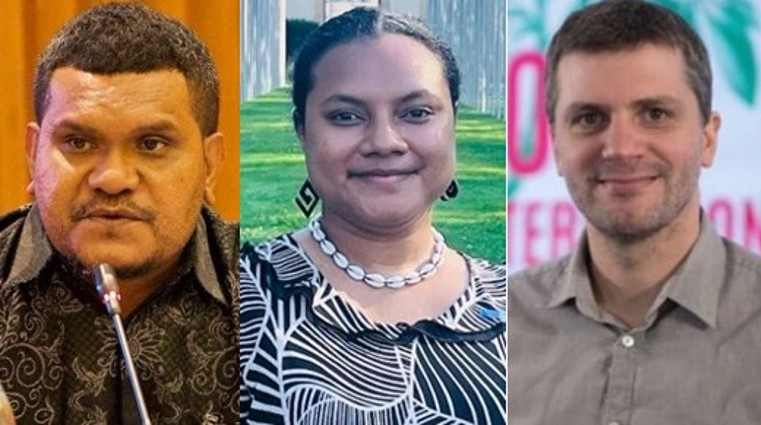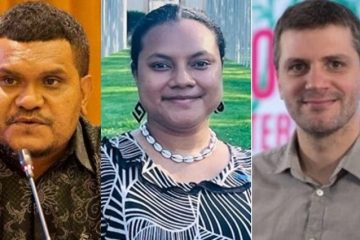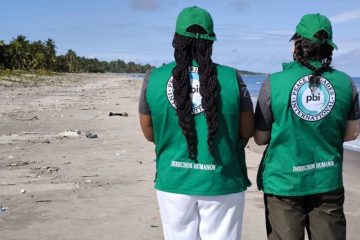Indigenous peoples from Indonesia, Honduras, Guatemala and around the world march in defence of life and territories outside COP30
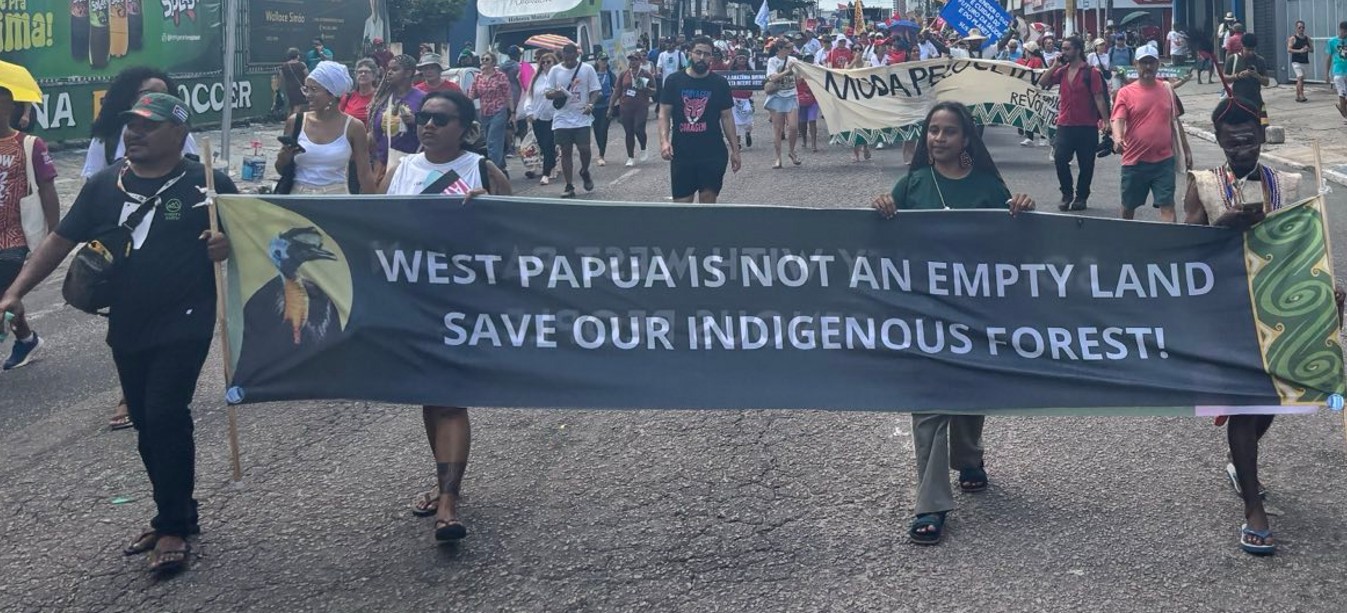
Photo: The delegation from West Papua at the Great People’s March in Belem, Brazil.
Indigenous West Papuan environmental defenders Teddy Wakum and Dina Danomira participated in the Great People’s March in Belem, Brazil yesterday (Saturday November 15) in the context of the ongoing United Nations COP30 climate summit.
Global Witness policy advisor and Peace Brigades International-Canada Board member Javier Garate was there too.
You can hear about this march and COP30 from all three of them this Tuesday November 18 at 1 pm ET. Register here for their update live from Belem.
The Guardian reports: “The streets of Belém echoed with indigenous chants, classical Brazilian songs and calls for environmental justice on Saturday [November 15] as tens of thousands of people marched to demand urgent action on the climate and nature crisis. …The ‘Great People’s March’ comes at the halfway point of contentious negotiations and follows two protests earlier in the week that were led by indigenous activists from the Tapajós region.”
Among the other groups at the march were the Council of Popular and Indigenous Organizations of Honduras (COPINH) and the Campesino Committee of the Highlands (CCDA) from Guatemala.
COPINH at COP30
The COPINH social media post says:
“COPINH present
COPINH participates in the People’s March for Climate, raising our voices in defence of life and territories.
Against extractive companies
We denounce companies that plunder our common goods, destroy forests and violate the rights of our communities.
Climate justice from the people
We march alongside sister organisations and communities to demand an end to projects that threaten the life and autonomy of indigenous peoples.
In defence of nature
We walk for the water, forests and culture that sustain our Lenca identity and the life of all humanity.”

Video clip with COPINH general coordinator Berta Zúniga Cáceres speaking during the Great People’s March in Belem, Brazil.
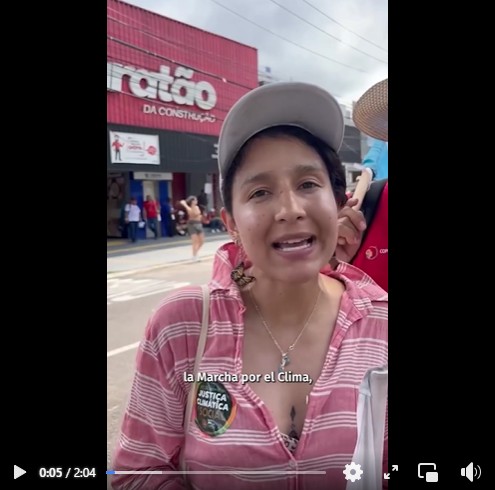
The video posted by COPINH included images of a massive sculpture of a cobra.
The Guardian explains: “Towards the back of the march, 80 protesters held up a 30-metre-long cobra. The Guardian caught up with them as they were taking the sculpture apart. Cobra is a double entendre, they explained: The snake is a sacred animal for Indigenous people in the Brazilian Amazon, and the word cobra also translates to ‘pay up!’ …Inspired by a dream that an Indigenous leader had, massive sculpture was built by 16 artists from Santarém municipality in Pará state, then brought over on a boat by the Indigenous youth movement the People’s Alliance. It took 83 people to hold it up.”
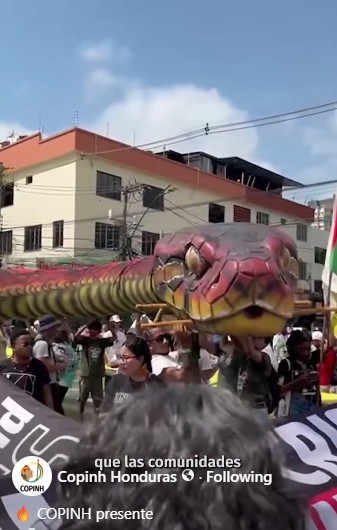
Remembering Berta Caceres
Berta Caceres, the co-founder of COPINH, was murdered on March 2, 2016, just months after COP21 concluded on December 11, 2015, in Paris.
More than 1,729 land and environmental defenders have been killed in the 9 years since Caceres was murdered. That’s an average of 192 defenders killed per year.
To date, the COPs have been largely silent on these ongoing attacks against defenders. It is believed that some States actively block inclusion of language on the important role of defenders on the front lines of the climate crisis and their protection needs.
The CCDA at COP30
The Campesino Committee of the Highlands (CCDA) social media post about the Great People’s March says:
“GLOBAL CLIMATE MARCH | COP30
CCDA Guatemala present
From Belém, Brazil, we join the Global Climate March, where activists, environmental defenders, indigenous peoples, peasant organisations and social movements raise their voices under the slogan: Climate justice now!”

Global Witness at COP30
Global Witness has been highlighting: “Brazil, the host of COP30, is historically among the most dangerous countries in the world for land and environmental defenders. The protection and meaningful participation of defenders at COP30 and beyond is an essential element of the fight against climate change.”
They have also stated: “At COP30, countries must agree to: Stop criminalisation against land and environmental defenders; Ensure transparent and prompt justice for defenders who have been attacked; Systematically identify, document and analyse attacks on land and environmental defenders” and more.
Mapuche land defender Julia Chuñil
While at COP30, Global Witness policy adviser and PBI-Canada Board member Javier Garate has helped raise awareness about the disappearance in Chile of Indigenous Mapuche land rights defender Julia Chuñil.
The 72-year-old grandmother “who fought for Mapuche land rights and practised ancestral farming methods and medicinal techniques” disappeared on November 8, 2024. She was last seen by a friend when leaving her home for a walk to the nearby Lafrir estate where she keeps her farm animals.
On October 23, 2025, the International Service for Human Rights (ISHR) noted that given the inaction of authorities in Chile “Pablo San Martín Chuñil, Julia’s son, petitioned the Committee to Support Implementation and Compliance of the Escazú Agreement [a binding regional human and environmental rights treaty], which concluded that there is evidence of intimidations, threats and stigmatisation against Julia’s family and therefore decided to activate its rapid response mechanism to compel the State to act. …The Committee also requested the Chilean State provide a written update detailing progress on enacting protective measures for Julia Chuñil’s relatives by 10 November.”
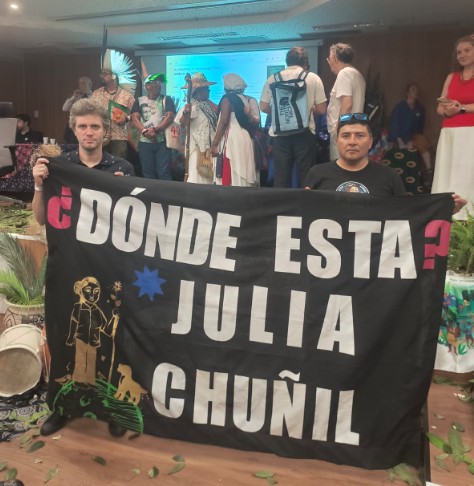
WEBINAR on Tuesday November 18
For an update from Global Witness and Indigenous land and environmental defenders from Indonesia who are at COP30, join us this Tuesday November 18 at 1 pm ET.
This webinar will take place three days before COP30 concludes.
The Guardian reports: “It is unclear what the outcome [of COP30] will be. The Brazilian hosts have said they do not plan to issue a cover decision – the agreement that is sometimes gavelled out at the end of the talk. Instead, they will focus on implementation. As yet no one is quite sure what that will look like.”
We will be asking Teddy, Dina and Javier their impressions of COP30 and for their assessment of the role the COPs can play in the defence of land and environmental defenders.
Join us for this discussion!
Webinar speakers Teddy Wakum, Dina Danomira, Javier Garate.
